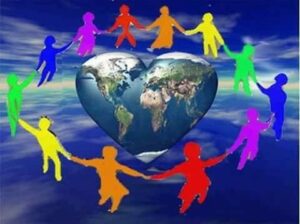The Earth Is But One Country, and Mankind Its Citizens. ~ Baha’u’llah

Conservation of the Earth’s Resources | Resources on Environment and Sustainable Development
Over a century ago Bahá’u’lláh warned, “The well-being of mankind, its peace and security, are unattainable unless and until its unity is firmly established…” Only upon a foundation of genuine unity, harmony and understanding among the diverse peoples and nations of the world, can a sustainable global society be erected. (1)
The environmental catastrophe we now face is a symptom of a much deeper malaise —of the human race at war with its own true nature. Rediscovering and developing our spiritual qualities therefore can no longer be dismissed as a marginal interest, it is now the central issue itself. To understand the heart of our environmental dilemma we must discover the true meaning of the oneness of humanity and the oneness of creation, and come to recognize that, in the words of Baha’u’llah, we are all “the fruits of one tree, and the leaves of one branch.” (2)
To contribute to this important discourse, we assert that the principle of the oneness of humankind must become the ruling principle of international life. This principle does not seek to undermine national autonomy or suppress cultural or intellectual diversity. Rather, it makes it possible to view the climate change challenge through a new lens – one that perceives humanity as a unified whole, not unlike the cells of the human body, infinitely differentiated in form and function yet united in a common purpose which exceeds that of its component parts. This principle constitutes more than a call for cooperation; it seeks to remold anachronistic and unjust patterns of human interaction in a manner that reflects the relationships that bind us as members of one human race. (3)
World Citizenship: A Global Ethic for Sustainable Development
The challenge of sustainable development is to inspire in people the willingness to think and act differently – the desire to become responsible citizens of an interdependent world…Fostering world citizenship is a practical strategy for promoting sustainable development. So long as disunity, antagonism and provincialism characterize the social, political and economic relations within and among the family of nations, a global, sustainable pattern of development can not be established. (4)
World citizenship begins with acceptance of the oneness of the human family and recognition of the interconnectedness of the nations of “the earth, our home.” While it encourages a sane and legitimate patriotism, it also insists upon a wider loyalty, a love of humanity as a whole. It does not imply abandonment of legitimate loyalties, the suppression of cultural diversity, the abolition of national autonomy, nor the imposition of uniformity. Its hallmark is “unity in diversity.” World citizenship encompasses the principles of social and economic justice, both within and among nations; non-adversarial decision making at all levels of society; equality of the sexes; racial, ethnic, national and religious harmony; and the willingness to sacrifice for the common good. Other facets of world citizenship – all of which promote human honor and dignity, understanding, amity, cooperation, trustworthiness, compassion and a desire to serve – can be deduced from those already mentioned. (4)
Seizing the Opportunity: Redefining the Challenge of Climate Change
The search for solutions to climate change has revealed the limits of traditional technological and policy approaches and has raised difficult questions about justice, equity, responsibility and obligation. As communities and policy-makers worldwide have wrestled with these questions, they have brought us all to the threshold of a tremendous opportunity. It is the opportunity to take the next step in the transition from a state-centered mode of interacting on the world stage to one rooted in the unity which connects us as the inhabitants of one biosphere, the citizens of one world and the members of one human civilization. The nature of this step, its significance and some of the means for its accomplishment are the focus of the Baha’i International Community’s contribution to forging a path out of the climate change challenge. (5)
The profound and far-reaching changes, the unity and unprecedented cooperation, required to reorient the world toward an environmentally sustainable and just future, will only be possible by touching the human spirit, by appealing to those universal values which alone can empower individuals and peoples to act in accordance with the long-term interests of the planet and humanity as a whole. (6)
A Small Selection of Quotations from the Baha’i Writings on the Environment
Visit Topics on this website or see International Environment Forum for more Baha’i writings on the environment.
Most Excerpts from Baha’i International Community BIC documents.
1. Unity and Consultation: Foundations of Sustainable Development – A Statement by the National Spiritual Assembly of the Bahá’ís of the United States – 1994
2. Unknown source
3. Seizing the Opportunity: Redefining the Challenge of Climate Change – BIC – 2008
4. World Citizenship: A Global Ethic for Sustainable Development – BIC – June 1993
5. Seizing the Opportunity: Redefining the Challenge of Climate Change – BIC – 2008
6. THE MOST VITAL CHALLENGE – BIC – read at the plenary of WCED in Rio deJaneiro on June 1992